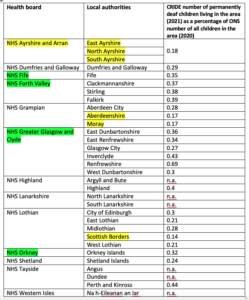The Consortium of Research in Deaf Education (CRIDE) report shows results of an annual survey to local authorities about the number of deaf children. The Scotland 2021 results have recently been published including a new table at the end (Table 28) which looks at the total child population in the authority as compared to the number of permanently deaf children living in the local authority area.
Below these results have been mapped to the NHS Health Boards to see if there is any pattern of success or not such good performance at Health Board level. We can assume that the proportion of deaf children in each authority is likely to be similar across Scotland.
There are missing data in this CRIDE survey because the capacity of local authorities has been severely stretched by Covid-19. We will have figures for 2021-22 soon which are likely to be more complete.
In addition, I may have mismatched the Local Authority to the Health Board. I would like feedback from readers on this. For example, the Scottish Borders has its own NHS Health Board, but for child audiology, parents take their children to NHS Lothian in Edinburgh. There may be similar arrangements I am not yet aware of.
From these initial results, we can see that four health boards seem to be performing well in that all the local authorities in their area, or nearly all, have a ratio of 0.3 or above. This would suggest a successful referral process is established in 4 of the 13 health boards.
What other factors may reduce the proportion of deaf children known to the local authority service for deaf children?
Distance to the audiology clinic could be one factor: if parents don’t attend appointments, their children will not be identified and they won’t be referred to the local authority service (e.g. Scottish Borders). Socio-economic status could be a factor too, for a similar reason. Some families can’t afford the travel costs or time, or don’t always attend appointments because of other stresses in their lives; on the other hand, in richer areas, parents can prioritise appointments, have more flexible working arrangements and travel costs are minimal for them (e.g. compare Glasgow and Renfrewshire).
The different health boards may have different approaches to referral. Mildly deaf children are not always referred from newborn screening, even though there is significant recent research showing that it is important for parents and services for deaf children to know about them as early as possible (Nasrullah et al., 2022). The particular screening test used in each health board may not successfully identify mildly deaf babies.
These figures suggest that the upcoming review of Audiology Services in Scotland led by Professor Jacqueline Taylor may need to look at these rates, the newborn screening tests used, and the referral practices in more detail. How many missed deaf children are there in Scotland, unknown to the local authority services for deaf children?
References:
CRIDE (2022) Educational provision for children in Scotland 2020-21.
https://www.ndcs.org.uk/media/7636/cride-2021-scotland-report-final.pdf
Nassrallah, F. Whittingham, J., Sun, H., & Fitzpatrick, E. (2022) Speech-language outcomes of children with unilateral and mild/moderate hearing loss, Deafness & Education International, DOI: 10.1080/14643154.2022.2047498

Rachel O’Neill
9.4.22


It is likely that the deafness incidence is underestimated, if surveys test only for sensorineural hearing loss (that can be rectified with hearing aids) and does not take account of Auditory Processing Disorder (APD). In England testing for this is by a smallish number of specialist clinics. The lead researcher in APD is Professor Doris Damiou at University College in London.